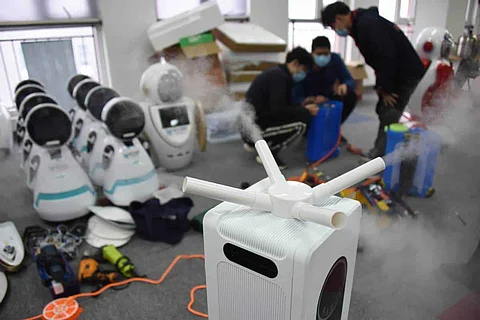

The public reaction to the coronavirus outbreak cannot be understated. The pandemic has affected the economy and society on a large scale. Where terrified people are practicing social distancing, the novel COVID-19 has particularly increased the interest in disruptive technologies including drones, robotics, artificial intelligence, and significant others. The innovations brought in by these mechanisms can aid authorities to deal with massive staffing shortages in healthcare, manufacturing, and supply chains. The industries that depend on factories and suppliers are experiencing a disruption in stock-flow with costs rising rapidly.
Big companies including Apple and Nike whose majority business relies on China-based manufacturers for mass production are also being affected worse. Such a crisis has compelled large organizations to revise their outsourcing strategies and consider in-house innovation for better backup during disastrous situations. As the virus is hugely affecting the production, warehousing, and logistics, robots can be a better enactment over damage limitation and ensure balanced business. Its high time when businesses should consider the advantages of automation and robotics.
For example, hospitals in Thailand are deploying "ninja robots" to measure fevers and protect the health of overburdened medical workers on the frontlines of the coronavirus outbreak. First built to monitor recovering stroke patients, the machines have been quickly re-purposed to help fight the pandemic outbreak. They have helped staff at four hospitals in and around Bangkok to reduce their risk of infection by allowing doctors and nurses to speak to patients over a video link. "They can stand outside the room and communicate with patients inside through the robot," said Viboon Sangveraphunsiri of Chulalongkorn University.
We can already observe the rapid growth in technology investments driving large scale adoption of the machine and artificial intelligence. The retail giants Amazon and Walmart along with some small outlets are moving towards future-proof automation practices, which includes robots-as-a-service, in their operations to cope with a further critical situation that might befall post coronavirus. According to ABI Research, it has been predicted, ahead of the pandemic outbreak, that there will be the deployment of around four million commercial robots across 50,000 warehouses by 2025 owing to the accelerating demands for delivery services across e-commerce channels. Across the online retail and logistics sector, robotics styled automation can help keep businesses running that are stuck with low-profit margins in current time. Owing to the social distancing, several industries including technology companies are incorporating a swelled interest in robots which has led to the pursuit of encouraging Robotics-as-a-Service (RaaS) integration.
Amalgamated with growing cloud technology and state-of-the-art quantum computing capabilities, RaaS will continue to gain stance beyond pandemic with more limited budgets and resources access. Be it warehousing, retail, logistics or manufacturing, all can prep for better services during seasonal demands and spikes of products in the near future, post-outbreak.
As noted by TechHQ, automation and robotics adoption is heading our way, but the current disruption could catalyze uptake on the road to economic recovery, as businesses across industries review operating models that were thrown to the wind so quickly overnight. It's worth noting, however, that simply on-boarding the technology is not a strategy in itself. Market pressures and unexpected circumstances need thorough contingency plans, regardless of whether workers are made of metal, rubber, and circuitry, or not.
Join our WhatsApp Channel to get the latest news, exclusives and videos on WhatsApp
_____________
Disclaimer: Analytics Insight does not provide financial advice or guidance on cryptocurrencies and stocks. Also note that the cryptocurrencies mentioned/listed on the website could potentially be scams, i.e. designed to induce you to invest financial resources that may be lost forever and not be recoverable once investments are made. This article is provided for informational purposes and does not constitute investment advice. You are responsible for conducting your own research (DYOR) before making any investments. Read more here.
